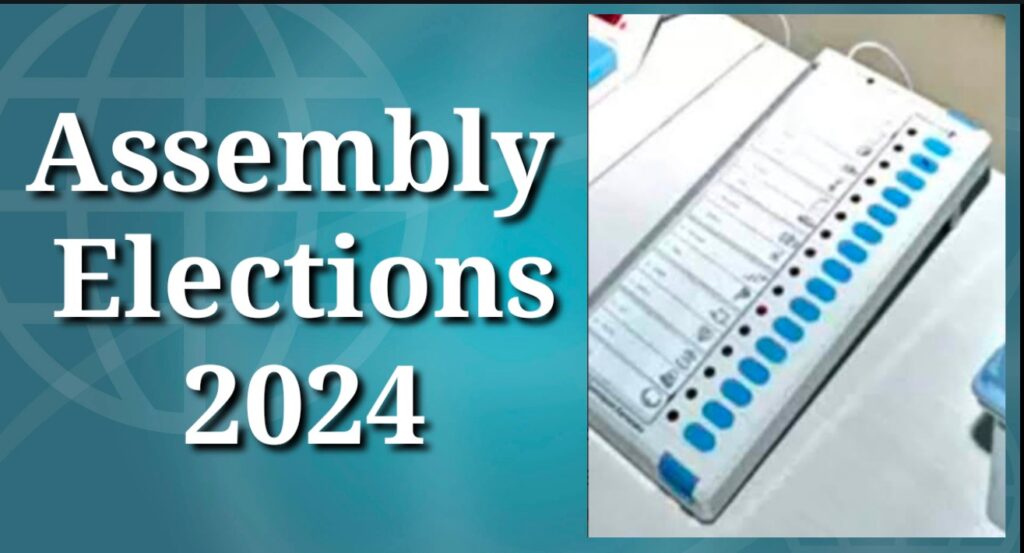Jammu and Kashmir Assembly Elections 2024: Political Dynamics and Regional Balance
•Samba Times Editorial

The 2024 Assembly elections in Jammu and Kashmir have proved to be of significant political importance across the nation. These elections are not only crucial locally but also have a considerable impact on national politics, as they are the first elections since the abrogation of Article 370 in 2019. This was the first election for Jammu and Kashmir as a Union Territory, where all major political parties devised their strategies. In the spotlight were the Bharatiya Janata Party (BJP), National Conference (NC), Congress, and several regional parties like the Awami Ittihad Party (AIP) and the People’s Democratic Party (PDP).
Key Highlights of the Election Results:
- BJP’s Impressive Performance:
The BJP showed strong results in the Hindu-majority regions of Jammu and Kashmir, winning a total of 29 seats. The party displayed a dominant grip in areas like Jammu and Samba districts. BJP’s electoral strategy resonated with the Hindu voters, who prioritized the party’s stance on national security, the abrogation of Article 370, and its emphasis on development. BJP leaders continuously raised these issues during their campaign, helping the party garner massive support.
- National Conference and Congress Alliance’s Success:
The National Conference (NC) and Congress ran the elections in alliance and managed to win a total of 49 seats, of which 42 seats went to the National Conference. The alliance saw significant success, particularly in the Kashmir Valley, where the party has a strong traditional base. NC leaders like Farooq Abdullah and Omar Abdullah strongly advocated for Kashmiri issues, influencing the electorate in their favor.
The Congress, which fielded several high-profile leaders, maintained its presence through the alliance, though it suffered major setbacks with some of its top leaders like Raman Bhalla, Chaudhary Lal Singh, and Tara Chand losing their seats, marking a significant blow to the party.
- AIP and Engineer Rashid’s Underperformance:
The Awami Ittihad Party (AIP), led by Engineer Rashid, failed to meet expectations in the elections. Despite his aggressive stance on separatist issues and Kashmir’s political concerns, Rashid was unable to connect with a broader electorate. His party saw limited success, and even in the Kashmir Valley, their performance fell short.
- Declining Influence of the People’s Democratic Party (PDP):
Once a dominant force in the Kashmir Valley, PDP faltered in this election. Under the leadership of Mehbooba Mufti, the party managed to win a few seats, but its base had significantly eroded compared to the 2014 elections. Since the abrogation of Article 370, PDP has struggled to regain its credibility, and its previous alliance with the BJP also led to diminishing public trust.
Election Campaign and Key Issues:
- Article 370 and National Security:
The abrogation of Article 370 and the revocation of Jammu and Kashmir’s special status were central themes in this election. The BJP made this decision a cornerstone of its campaign, framing it as essential for development, stability, and national security. In Jammu, in particular, this issue helped the BJP win widespread support.
- Local Autonomy and Identity:
In the Kashmir Valley, National Conference and PDP linked Article 370’s abrogation to the erosion of local autonomy and Kashmiri identity. These parties raised concerns about protecting Kashmiri culture and regional autonomy, rallying voters around these themes.
- Development and Employment:
The BJP and the central government highlighted the development initiatives and investment projects in the region. The party emphasized improvements in infrastructure, electricity, and roads in Jammu and Ladakh, promising employment and regional growth to the people.
Election Outcome:
- The BJP’s strong performance in Hindu-majority areas showcases that the party’s focus on national security and development paid off.
- The National Conference-Congress alliance emerged as a strong opposition, particularly with NC maintaining its dominance in the Kashmir Valley.
- The underperformance of regional parties like AIP and PDP suggests a shifting electorate even in the Valley.
- These election results indicate new political alignments in the future of Jammu and Kashmir’s politics, with BJP establishing a solid presence and National Conference remaining a key opposition.
Conclusion:
The 2024 Jammu and Kashmir Assembly elections have brought significant political shifts. The BJP solidified its position in Hindu-majority areas, while the National Conference retained its hold in the Kashmir Valley. These elections will shape the future political balance in Jammu and Kashmir, potentially leading to new political strategies and alliances.
BJP’s Unexpected Victory in the Recent Haryana Assembly Elections
The Bharatiya Janata Party (BJP) has achieved an unexpected victory in the recent Haryana Assembly elections. This win came as a significant surprise to many political analysts, especially considering the challenges faced by the BJP in the state prior to the elections, particularly following the farmers’ agitation. Despite this, the party succeeded due to its strong electoral strategy and efficient organizational structure.
Reasons for BJP’s Strategy and Success:
- Organizational Strength: The BJP established a strong presence across Haryana through its grassroots organizational network. The party conducted various programs to reach out to voters and understand their issues.
- Image of Prime Minister Narendra Modi and Chief Minister Manohar Lal Khattar: The popularity of Prime Minister Modi and the administrative experience of Chief Minister Manohar Lal Khattar solidified the BJP’s position among voters. Khattar’s “honest and clean” image particularly attracted urban voters.
- Polarization Politics: The BJP effectively conveyed its message in the Hindu-majority areas of the state and also leveraged polarization politics. The party conducted aggressive campaigns on social issues and security-related questions, which benefited them.
- Development Issues: The BJP prominently highlighted development initiatives in its campaign. The work done on roads, electricity, and other infrastructure was presented to the public. Additionally, central schemes like the Ujjwala scheme and the Pradhan Mantri Awas Yojana were also promoted.
- Failure of Narrative of Farmers & Wrestlers Issues: the failure of narrative of farmers and wrestler issues were also one of the reason of BJP’s success it seems in this elections that these issues appear to the voters as a false narrative
Congress’s Defeat:
The Congress party, which was trying to emerge as a major opposition party in the state, faced disappointment in the elections. Despite fielding several prominent leaders, internal factionalism and a weak organizational structure led to its defeat. Key Congress leaders like Bhupinder Singh Hooda and Kumari Shelja were unable to secure a win for the party. According to the political analysts negative chemistry between Bhupendra Singh hudda and Kumari shailaja was also the reason of this defeat
JJP and Other Regional Parties:
Dushyant Chautala’s Jannayak Janata Party (JJP) showed some strength in certain areas but did not achieve the success it had hoped for. The JJP managed to establish its influence in Jat-dominated regions, but this was limited in the face of the BJP’s stronghold.
Election Results and Impact:
The BJP’s unexpected victory signals a significant shift in Haryana’s political landscape. The BJP has emerged as the largest political force in the state, and this success will influence future electoral strategies.
The Congress will need to reassess its strategies, and changes in leadership may also be considered.
The JJP and other regional parties will have to adopt new approaches to strengthen their position, especially in rural areas.
Conclusion:
The BJP’s unexpected victory in the Haryana elections has placed the party in a strong position in the state, while the Congress and other opposition parties need to engage in self-reflection. This win for the BJP could not only change the political landscape of Haryana but also boost the party’s confidence nationwide.
Rahul Sambyal ✍️
Poliyical Analyst & Executive Editor Samba Times





